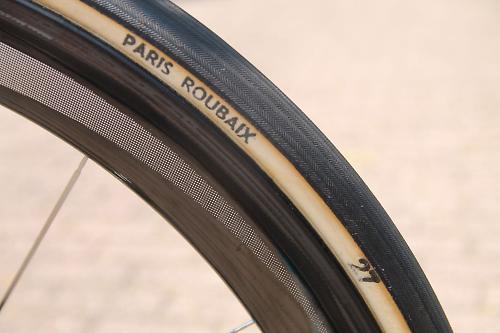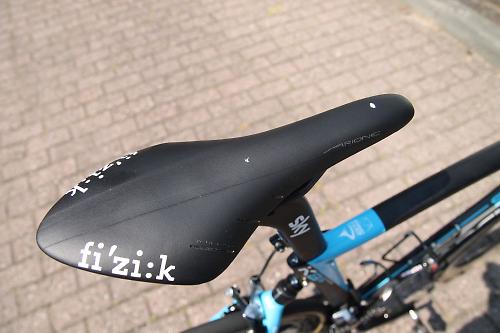- News
- Reviews
- Bikes
- Components
- Bar tape & grips
- Bottom brackets
- Brake & gear cables
- Brake & STI levers
- Brake pads & spares
- Brakes
- Cassettes & freewheels
- Chains
- Chainsets & chainrings
- Derailleurs - front
- Derailleurs - rear
- Forks
- Gear levers & shifters
- Groupsets
- Handlebars & extensions
- Headsets
- Hubs
- Inner tubes
- Pedals
- Quick releases & skewers
- Saddles
- Seatposts
- Stems
- Wheels
- Tyres
- Tubeless valves
- Accessories
- Accessories - misc
- Computer mounts
- Bags
- Bar ends
- Bike bags & cases
- Bottle cages
- Bottles
- Cameras
- Car racks
- Child seats
- Computers
- Glasses
- GPS units
- Helmets
- Lights - front
- Lights - rear
- Lights - sets
- Locks
- Mirrors
- Mudguards
- Racks
- Pumps & CO2 inflators
- Puncture kits
- Reflectives
- Smart watches
- Stands and racks
- Trailers
- Clothing
- Health, fitness and nutrition
- Tools and workshop
- Miscellaneous
- Buyers Guides
- Features
- Forum
- Recommends
- Podcast
TECH NEWS
Tour de France Bikes 2015: Luke Rowe’s Pinarello Dogma K8-S ready for the cobbles
The Tour de France encounters the pave of Belgium today with seven sectors of cobbles totaling 13.3km, which doesn’t sound like a lot in a 223.5km stage - the Tour’s longest - but that hasn’t stopped the teams from preparing its Paris-Roubaix special bikes for the stage.

Team Sky will roll out on the new Pinarello Dogma K8-S, which debuted at that race back in April, and features a suspension damper at the top of the seatstays designed to isolate, to an extent, the rider from the vibrations caused by the cobbles. Pinarello claims the new Dogma K8-S can boost rider comfort by as much as 50% compared to a regular bike.
This bike belongs to Luke Rowe, who will doubtless be working hard over the cobbles to help Chris Froome defend the yellow jersey, but just as critically marshalling Froome safely and cleanly over the cobbles which are heaped up towards the end of this long stage. The whole team obviously wants to avoid a repeat of last year’s crash which put the Tour contender out of the race.

In designing the new Dogma K8-S, the Italian bicycle company has developed a small suspension unit that sits at the top of the seatstays. It houses a piston and elastomer bumper that can be tuned for rider weight and softness preference. There are no pivots in the rear triangle, instead Pinarello has modified the carbon fibre layup in the chainstays, flat and wide towards the dropouts, that provide the desired range of flex to make the whole thing work.

The concept isn’t a new one. The idea of flexible carbon fibre stays was used quite widely on early mountain bikes, with companies like Trek and Cannnondale both at one point offering soft tail mountain bikes. There were a few road versions, most famously Trek's brief flirtation with a soft tail race bike for the Discovery team, but that ended soon after George Hincapie's ill-fated Paris-Roubaix, when the steerer tube on his bike snapped.

Along with the new damper unit, Pinarello has also developed a new aero seatpost that it reckons provides up to 40% more absorption of vertical forces.
The Dogma K8-S frame is equipped with much the same kit as Luke Rowe’s regular Dogma F8 road bike, with a Shimano Dura-Ace Di2 groupset providing the shifting and braking, with the optional Di2 sprint shifters. The cassette is an 11-25t item, as Paris-Roubaix, and today’s stage of the Tour de France, feature virtually no climbing.

There are some notable detail changes though. He’s using a chainset with a 53/44t chainring combination, instead of the regular 53/39t setup - that’s because the stage is mostly flat and 39t is simply too low, but the 44t provides a smaller step down from the big ring if he needs it. Luke Rowe also uses long 175mm crank arms rather than the more common 172.5mm.

Wheels are Shimano Dura-Ace C50 carbon fibre tubular tyres, pretty standard fare, but they’re fitted with FMB Paris-Roubaix 27mm tyres, the same rubber the team uses in the Paris-Roubaix. Because of course this is the same bike and set up used for that race.

The Elite bottle cages have a grippy tape material added to prevent the water bottles ejecting.

It looks like he has a double wrap of PRO bar tape on the aluminium PRO handlebars.

His stem is an aluminium PRO product too, in a 141mm length.

A Fizik Arione saddle in all-black with white marks, there to help the mechanics set up the correct saddle position. Each bike in the Team Sky truck had the same white marks, suggesting they have developed a precise system for replicating saddle position across different bikes.

Of course Team Sky has a neat way of fixing the race number boards to the bike. The small mount is glued to the seatpost, with two Allen bolts to secure the number plate. No zip ties here.
David worked on the road.cc tech team from 2012-2020. Previously he was editor of Bikemagic.com and before that staff writer at RCUK. He's a seasoned cyclist of all disciplines, from road to mountain biking, touring to cyclo-cross, he only wishes he had time to ride them all. He's mildly competitive, though he'll never admit it, and is a frequent road racer but is too lazy to do really well. He currently resides in the Cotswolds, and you can now find him over on his own YouTube channel David Arthur - Just Ride Bikes.
Latest Comments
- stonojnr 37 min 12 sec ago
the police barely do anything with close pass data, like just analyse the clear geographic hot spots and setup camera vehicles themselves....
- Disgusted of Tunbridge Wells 46 min 58 sec ago
Yep - said the same on the YT comments...
- Jogle 1 hour 14 min ago
I bet those ambulances have never paid tax in their lives! They should get out of the way of hard working, tax paying, otherwise law abiding cars
- Capt Sisko 3 hours 31 min ago
Just like folding helmets. Every couple of years someone thinks, that's a brilliant idea, I'll sell millions, I'll make a fortune. Erm, no.
- eburtthebike 4 hours 49 min ago
He understands it: his social media site is called Truth Social or somesuch.
- chrisonabike 6 hours 12 min ago
Because they can....
- Secret_squirrel 6 hours 17 min ago
If the employee's of Komoot are mostly German employees on standard German contracts the new Italian owners are in for a bit of a shock....
- Robert Hardy 6 hours 24 min ago
Raising the maximum price limit a few years ago may be providing an avenue for abuse but I now see more and more parents delivering their children...


























Add new comment
5 comments
The K8 did not have its debut at Paris-Roubaix. I saw it personally at RVV a week before P-R.
I'm surprised that they have gone to such lengths at the rear but little at the front to reduce shocks and vibration - I would have thought that the vibration from the bars would add noticeable rider fatigue too.
I'd imagine that as well as comfort the "shock" helps to maintain tyre/road contact which would aid grip and power transfer? Very useful performance enhancements and another marginal gain.
"The whole team obviously wants to avoid a repeat of last year’s crash which put the Tour contender out of the race."
Froome didn't crash on the cobbles, he didn't even make it to the first section of pave...
I guess what they mean is the deflection of the frame. It doesn't, however, change the fact that deflection can't be simply translated to a specific figure describing comfort!